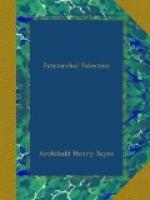A curious letter to Khu-n-Aten from Burnaburyas, the Babylonian king, throws a good deal of light on the nature of the Egyptian government in Canaan. Between the predecessors of the two monarchs there had been alliance and friendly intercourse, and nevertheless the Canaanitish subjects of the Pharaoh had committed an outrageous crime against some Babylonian merchants, which if left unpunished would have led to a rupture between the two countries. The merchants in question had entered Palestine under the escort of the Canaanite Ahitub, intending afterwards to visit Egypt. At En-athon, near Acre, however, “in the country of Canaan,” Sum-Adda, or Shem-Hadad, the son of Balumme (Balaam), and Sutatna, or Zid-athon, the son of Saratum, [His name is written Zurata in the letter of Biridi, the governor of Megiddo; see above, p. 135.] who was governor of Acre, set upon them, killing some of them, maltreating others, and carrying away their goods. Burna-buryas therefore sent a special envoy, who was instructed to lay the following complaint before the Pharaoh: “Canaan is thy country and the king [of Acre is thy servant]. In thy country I have been injured; do thou punish [the offenders]. The silver which they carried off was a present [for thee], and the men who are my servants they have slain. Slay them and requite the blood [of my servants]. But if thou dost not put these men to death, [the inhabitants] of the high-road that belongs to me will turn and verily will slay thy ambassadors, and a breach will be made in the agreement to respect the persons of ambassadors, and I shall be estranged from thee. Shem-Hadad, having cut off the feet of one of my men, has detained him with him; and as for another man, Sutatna of Acre made him stand upon his head and then stood upon his face.”
There are three letters in the Tel el-Amarna collection from Sutatna, or Zid-atna ("the god Zid has given”) as he writes his name, in one of which he compares Akku or Acre with “the city of Migdol in Egypt.” Doubtless satisfaction was given to the Babylonian king for the wrong that had been done to his subjects, though whether the actual culprits were punished may be questioned. There is another letter from Burna-buryas, in which reference is again made to the Canaanites. He there asserts that in the time of his father, Kurigalzu, they had sent to the Babylonian sovereign, saying: “Go down against Qannisat and let us rebel.” Kuri-galzu, however, had refused to listen to them, telling them that if they wanted to break away from the Egyptian king and ally themselves “with another,” they must find some one else to assist them. Burna-buryas goes on to declare that he was like-minded with his father, and had accordingly despatched an Assyrian vassal to assure the Pharaoh that he would carry on no intrigues with disaffected Canaanites. As the first part of his letter is filled with requests for gold for the adornment of a temple he was building at Babylon, such an assurance was very necessary. The despatches of Rib-Hadad and Ebed-Tob, however, go to show that in spite of his professions of friendship, the Babylonian monarch was ready to afford secret help to the insurgents in Palestine. The Babylonians were not likely to forget that they had once been masters of the country, or to regard the Egyptian empire in Asia with other than jealous eyes.




